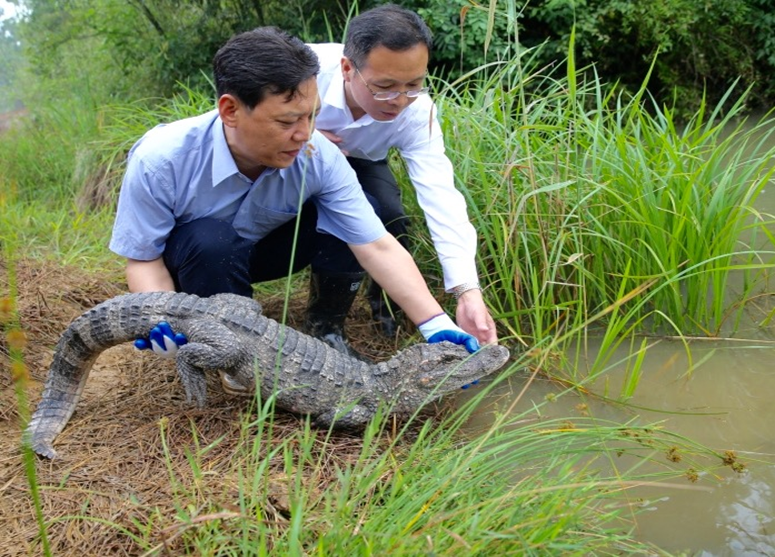18 adult captive-bred Chinese alligators returned to nature (Photo by Gu Changming)
(Originally published on 06/08/2016)
Anhui, China —18 adult captive-bred Chinese alligators were released into the Gaojingmiao State Forest Farm in Langxi County by the Anhui Yangtze River Alligator National Nature Reserve (NNR) on May 22nd, to boost the population of these endangered species.
This is the largest group of Chinese alligators that have been released to their natural habitat by the Yangtze River NNR, which has so far accumulatively returned 96 alligators back into their natural habitat. “These alligators have had blood and DNA tests to make sure that they are fit and strong, said Wu Rong, head of the NNR’s administrative bureau, “To avoid in breeding, all the alligators were fitted with electronic ID chips, and six of them also had radio transmitters to help researchers track them in the future.”
The Chinese alligator, also known as the Yangtze alligator, is one of the rarest crocodilian in the world, only native to China and live along the middle and lower reaches of the Yangtze. The population of this species has dropped rapidly in the past few decades due to habitat loss and uncontrolled killing.
The Anhui Yangtze Alligator NNR began its captive-release program in 2002, so far the NNR has released approximately 100 alligators back into the wild. The reintroduced alligators have been confirmed to adapt well to their new life in the wild and have reproduced according to the monitor results from expertise and equipment.
The UNDP-GEF Strengthening the Effectiveness of the Protected Area System in Anhui Province project (hereby referred as UNDP-GEF Anhui Wetland Project) , launched in 2013, is working together with wetlands like Anhui Yangtze Alligator NNR to better conserve its biodiversity and eco-system. As one of the project’s demonstration sites, the NNR was supported by the UNDP-GEF Anhui Wetland project to restore habitat for the Yangtze Alligators and other species. Meanwhile, the project has also conducted public awareness raising activities on the nearby communities to further engage the public to protect the endangered species together.
All efforts contribute to the overall goal of the project, which aims to strengthen the management effectiveness of the Wetland Protected Area (WPA) systems in Anhui in response to the existing and emerging threats to the globally significant biodiversity and essential ecosystem services. It is expected that the 5-year project will help to improve habitat in quality and area and reduce on-site threats to biodiversity including Chinese alligators in the Anhui WPA systems.

 Locations
Locations




